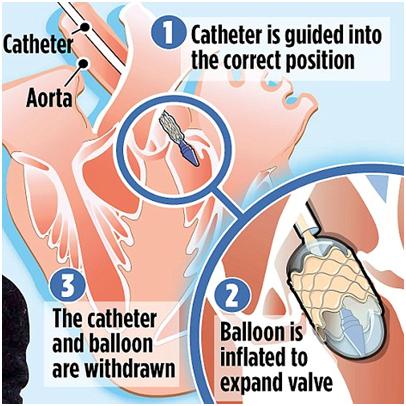
Local Cardiologist offers the world-class, ground-breaking procedure to patients!
Leesburg, FL – Beginning in February 2012 at the Leesburg Regional Medical Center (LRMC), a local cardiologist has successfully treated some very special cardiac patients through a new procedure called transcatheter aortic valve implantation (TAVI). LRMC is one of only four facilities in Florida authorized to offer the TAVI procedure, and Citrus Cardiology Consultants, PA, has received the advanced training necessary to perform a new procedure specifically developed to treat the life-threatening condition of severe aortic stenosis (AS).
What Is Aortic Stenosis?
The aorta is the main artery carrying blood out of the heart. When blood leaves the heart, it flows through the aortic valve, into the aorta. In aortic stenosis, the aortic valve does not open fully, which decreases blood flow from the heart.
Aortic stenosis is the most common type of valve disease. In older patients, it is usually the result of calcium building up in the heart’s main valve, the aortic valve, making the flexible tissue stiff and hindering blood flow.
As the aortic valve narrows, the pressure increases inside the left heart ventricle. This causes the left heart ventricle to become thicker, which decreases blood flow and can lead to chest pain. The heart has to pump harder to force blood through, causing symptoms including dizziness, fainting, breathlessness, and heart palpitations.
As the pressure continues to rise, blood may back up into the lungs, and you may feel short of breath. Severe forms of aortic stenosis prevent enough blood from reaching the brain and rest of the body. This can cause light-headedness and fainting. If the disease is not treated, patients suffering serious symptoms usually die of heart failure within three years.
How Is It Treated?
The best solution is valve-replacement surgery. Traditionally, aortic valves are replaced via open-heart surgery, which involves opening up the patient’s chest, putting their heart on a bypass machine and replacing the valve. Traditional aortic valve replacement can be performed at very low risks in otherwise healthy patients and offers excellent survival.
But a third of those needing a valve replacement is turned down for this operation because the risks are too high. They may suffer from severe aortic stenosis and coexisting conditions eliminating them as a candidate for an open-chest surgical replacement of the aortic valve. For those patients, a revolutionary new procedure called transcatheter aortic valve implantation (TAVI) may be an option.
What is TAVI?
The procedure treats heart-valve failure under local anesthetic, and without the need for a more invasive open chest procedure. TAVI requires only a small incision in the thigh into which a catheter is inserted. At the end of the catheter is a deflated balloon as well as the collapsible artificial valve. When the catheter reaches the faulty valve, the balloon is inflated which, in turn, expands the mesh valve, pressing the faulty valve against the wall of the aorta. (See Fig. 1)
